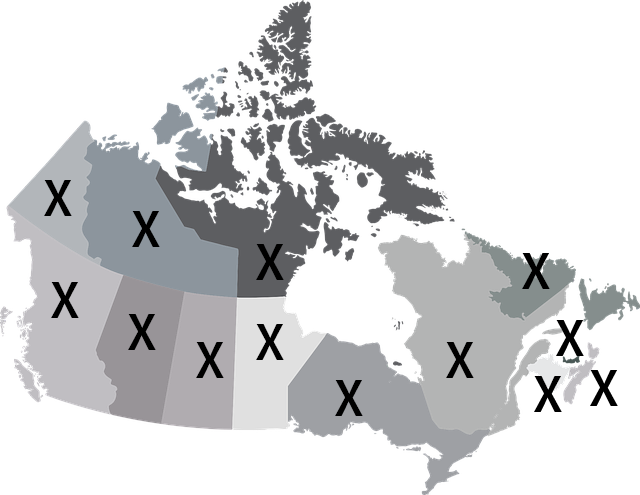QUIZ: Find out what province you should move to for the privacy protections that YOU care about!
Do you know that based on where you live in Canada, you have very different privacy rights? As strange, unequal, and unjust as that might sound, it’s true: Canada’s federal government has failed to act to defend everyone’s privacy rights, which means a growing patchwork of regional privacy laws is creating privacy haves and have nots in different provinces and territories.
While we wait for the federal government to do something to fix it, take our quiz and find out where you’ll need to live to get the privacy protections most important to you.
1. Do you care about political parties trying to use sensitive information about you – like your religion, sexuality, age, gender, or interests – to influence your behavior?
You should pick up your things and move out west to British Columbia, the ONLY place in Canada where federal political parties are required to comply with any privacy laws!

According to a new decision from BC’s Office of the Information and Privacy Commissioner, BC’s privacy laws apply to political parties at every level – meaning they’re all required to ask for your permission before collecting, using, or disclosing your personal information.
Welcome to BC, the only place in Canada where there are limits to how your personal information can be weaponized by federal political parties!
You can probably stay where you are! But it might still interest you that British Columbia is the only province where there are rules around how federal political parties use your sensitive personal information.
That’s because BC’s Office of the Information and Privacy Commissioner just ruled that political parties at every level must comply with BC’s privacy laws, which require organizations to ask for permission before collecting, using, or disclosing your personal information.
It’s a great big country and for federal political parties outside BC, it’s still the wild west for them to do whatever they want with your data. Yeehaw!
2. Do you care about Canadian and US border guards searching your digital devices without cause?
Alberta is the place for you!

The Alberta Court of Appeal recently ruled against border guards being able to search digital devices without reason, calling the broad based nature of these ongoing searches unconstitutional.
In response, the Government of Canada has proposed a new bill that now requires border agents to have a “reasonable general concern” (whatever that means) to conduct digital searches again.
But for the time being, Alberta is the only place in Canada where border guards aren’t allowed to indiscriminately search all your digital devices. Hurray for the Charter of Rights and Freedoms!
Fair enough – but keep in mind that the sensitive information carried by today’s digital devices includes your complete messaging history with all of your contacts, financial information, sensitive personal photos and a whole lot more!
Right now in every province but Alberta, all your digital devices can be searched by both Canadian and US border guards for any reason. This includes confiscating devices and downloading all of the data from your devices.
Alberta just took the first step to limit this practice, as its Court of Appeal has ruled that border guards indiscriminately searching digital devices is unconstitutional. (That pesky Charter of Rights and Freedoms!)
But this protection may not be long lived; a change is coming to Alberta. The Government of Canada has just proposed a new bill that will require border agents to only have a “reasonable general concern” (whatever that means) to conduct digital searches again!
3. Do you want to know if your employer spies on you while you’re working from home?
You’ll want to be living in Ontario, where a piece of legislation that protects the privacy rights of workers has been proposed.

In this new era of working from home, employers are finding all kinds of new ways of surveilling their remote workers, including productivity monitoring software that records mouse clicks and keystrokes, and can even decipher our facial expressions and learn our emotions. (You’re never alone if Big Brother is always watching!)
But be warned: experts are already saying that the bill doesn’t go far enough! Being informed when you’re being watched by your computer is a bare minimum – but should this micro-tracking be permitted at all?
You’re probably fine to stay right where you are! Ontario is the only province threatening this emerging status quo, where legislation has been proposed that protects the right of workers to be informed when they’re being digitally monitored. No province has forbidden the practice.
In this new era of working from home, employers have found all kinds of new ways of surveilling their remote workers, like productivity monitoring software that records mouse clicks and keystrokes, and can even decipher our facial expressions and learn our emotions.
You’re never alone if Big Brother is always watching!
4. Do you care about whether law enforcement agencies are using artificial intelligence to assess you, like facial recognition technology and predictive policing tools?
Too bad, there really isn’t a good place to live anywhere in Canada with respect to this issue.

The RCMP has been using facial recognition technology for years, including privacy law violating Clearview AI software. The RCMP says that they aren’t responsible for the legality of the products they procure from third-parties. (They’re in the law enforcement, not abidance, business.)
The Vancouver Police Department has been using predictive policing technology since 2016, has experimented with facial recognition technology from Clearview AI, and has no public policy related to the use of artificial intelligence.
The only place in Canada where the police have moved towards creating a policy related to the use of artificial intelligence is Toronto. But be warned: the Toronto Police Service has already been using facial recognition technology for years.
Canadian law is in step with you! All across Canada our government has failed to regulate how police are using new technologies, like artificial intelligence and facial recognition. But the risks of these technologies are growing; in the US, three individuals have already been wrongly arrested after they were incorrectly identified by biased facial recognition software.
The RCMP has been using facial recognition technology for years, including privacy law violating Clearview AI software, and says that they aren’t responsible for the legality of the products they procure from third-parties. (They’re in the law enforcement, not abidance, business.)
The Vancouver Police Department has been using predictive policing technology since 2016, has experimented with facial recognition technology from Clearview AI, and has no policy related to the use of artificial intelligence. The only place in Canada where the police have moved towards creating a policy related to the use of artificial intelligence is Toronto. Nonetheless, the Toronto Police Service has already been using facial recognition technology for years.
5. Do you want to know if computers are making important decisions about you through automated decision-making?
Beginning in Fall of 2023, Quebec will be the place for you!

New privacy laws in Quebec require organizations to notify people if automated decision-making is taking place, and provide them with an opportunity to object.
While technically this has also been required of the federal government since 2020, those public bodies are not monitored for compliance, and under no real obligation to comply because of Canada’s weak enforcement of privacy laws.
Knowledge is power – but hey, you do you! The only province that has gone beyond your requirements for now is Quebec. Beginning in the Fall of 2023, Quebec’s new privacy laws will require organizations to notify people if automated decision-making is taking place and provide them with an opportunity to object.
We think it is worth pointing out that automated decision-making may already be affecting you more than you might think; more and more companies and agencies are involving AI systems in important decisions like hiring, performance assessment, identifying criminals and much more, with very little transparency into how they do it.
While there’s a very soft requirement that federal government departments and agencies act transparently when they’re using automated decision-making, there's really no obligation for them to actually do so.
6. Do you care about having enforceable, actionable privacy rights?
I have some unfortunate news for you.

Canada's federal privacy watchdog, the Office of the Privacy Commissioner, does not have the ability to issue binding orders or fines against privacy violating companies and has little to no jurisdiction over the federal government. Likewise, provincial privacy watchdogs are limited in their ability to issue fines against public bodies or private organizations that violate Canada’s privacy laws.
You are in luck! Canada’s privacy laws are incredibly underenforced. Our federal privacy watchdog doesn’t have the ability to issue binding orders or fines against public bodies or private organizations that violate our privacy laws. In fact, companies that have been found to be breaking Canada’s privacy laws are free to challenge the decisions of Canada’s privacy watchdog in federal court, as many are currently doing. Keep living wherever you are, knowing that your privacy rights are largely unenforceable!
No matter where you live in Canada, I hope you agree that it’s absurd that your location has an impact on your right to privacy.
Everyone in Canada deserves the same high level of protection of our privacy.
We have an opportunity right now to put an end to unequal privacy rights that are growing through our regional patchwork and #DemandPrivacy from the federal government. Strong federal privacy reforms will provide fair, enforceable, comprehensive protections for the greatest number of us.
Sign the petition and #DemandPrivacy today! Or sign up below to be notified on our next privacy campaign.